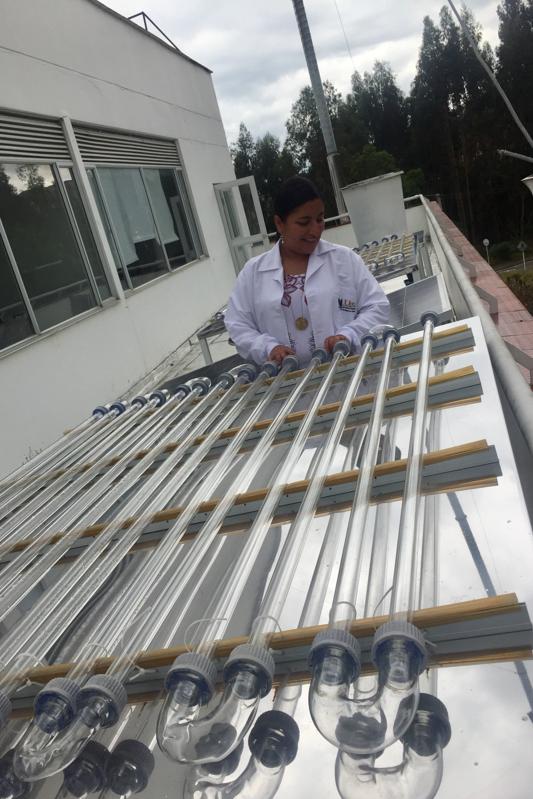
Julie Joseane Murcia Mesa at the Catalysis Group at the Universidad Pedagógica y Tecnológica de … [+]
JULIE JOSEANE MURCIA MESA
Colombian catalyst researcher Julie Murcia and her team have built a pilot plant of a technology they’ve developed to purify water, which will ultimately help both remote communities with drinking water and reduce pollution in industrial wastewater.
Murcia, who is a professor at the Universidad Pedagógica y Tecnológica de Colombia in Tunja, Colombia, says that since 2016 she’s been working on a research project financed by the university and Colombia’s science ministry, to build a pilot plant based on new technologies which were formally announced to in a patent in October 2020.
The patent says the technology combines flocculation (the forming of clusters of waste particles so they can be removed), with solar photocatalysis (using light and catalysts to speed up the breakdown of certain pollutants) and a series of tubes supported on an inclined bed.
“I have been working and searching for suitable solutions in environmental remediation, currently, from our efforts we can employ solar photocatalysis in real-world contexts” she said.
“The main idea of this pilot plant is that it can be applied in purification of water for human consumption in low-income communities located on faraway places,” Murcia said, “but also this plant can be employed for the treatment of industrial effluents, before this wastewater can be poured into the drain, and can affect natural water sources.”
Murcia says the main difference that sets her work apart is studying the effectiveness of solar photocatalysis in the treatment of the outflows from handicrafts factories highly polluted with industrial dye-stuffs, dairy production wastewater.
“We’ve also have analyzed the elimination of enteropathogenic bacteria (that cause intestinal problems) and organic pollutants from natural water sources in highly affected for municipal wastewater,” she said.
Countryside to Catalysts
Murcia was born in Tunja, Boyacá, Colombia and I grow up at the countryside of this Colombian city.
“I studied at a rural school and from the first years of my academic study I started to dream to be a big scientist in the future,” she said, “I felt a special interest and love for chemistry and finally I achieve my Bachelor of Science degree in this knowledge area.”
Murcia then ended up in Europe for her PhD studies, then after five years moved back to her homeland.
“I decided to come back to Colombia in order to apply the new knowledge in my country at the service of the people,” she said, adding that since 2014 she has been a professor and researcher at the Universidad Pedagógica y Tecnológica de Colombia.
“I am a happy scientist, teaching and learning every day,” she said, “I have learned side by side with the best scientists around the world, so I am deeply grateful to all of them.”
Practical Science
Murcia said that practical applications of science in the Global South are particularly important.
“I think that each country has its own priorities and needs,” Murcia said, adding that scientists should be able to identify these factors so that they can achieve the highest impact of their research in real context and communities.
“When the technological and scientific advances are focused on a real need, the potential of success is bigger,” she said.
Murcia said that like in other parts of the world, Covid-19 presents an additional challenge for scientific research.
“Currently we are worried about the pandemic, because working from home is not suitable for all the experimental activities that we need to perform at the lab and field, but we are optimistic about this situation will be overcome soon,” she said.

Julie Joseane Murcia Mesa at the Catalysis Group at the Universidad Pedagógica y Tecnológica de … [+]
Julie Joseane Murcia Mesa
Another woman in STEM who focuses on water is Rwandan mechanical engineer Christelle Kwizera, who grew up in the aftermath of the country’s genocide.
“Women in Sub-Saharan Africa lose 200 million hours daily walking for water and waterborne diseases like diarrhea are leading causes of mortality, especially for children,” Kwizera said.
She is now using a network of boreholes and purified water microgrids to give over 100,000 people access to water – especially important during the Covid-19 pandemic.
This article is auto-generated by Algorithm Source: www.forbes.com


